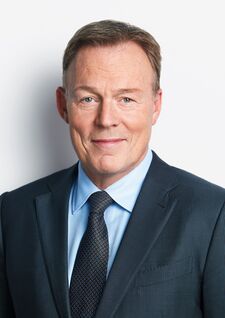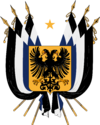Kaspar Vahl: Difference between revisions
No edit summary |
No edit summary |
||
| Line 5: | Line 5: | ||
|image_size = 225 | |image_size = 225 | ||
|caption = Vahl in 2019 | |caption = Vahl in 2019 | ||
|office | |office = [[Chancellor of Vierzland]] | ||
|deputy | |deputy= [[Tilman Kohl]]<br>[[Nick Krämer]] | ||
|term_start | |term_start = 16 February 2012 | ||
|term_end | |term_end = | ||
|predecessor = [[Erhardt Preisner]] | |predecessor = [[Erhardt Preisner]] | ||
|successor = | |successor = | ||
|office1 = Chairman of the [[National Democratic Party (Vierzland)|National Democratic Party]] | |office1 = {{nowrap|Chairman of the [[National Democratic Party (Vierzland)|National Democratic Party]]}} | ||
|deputy1 = [[Adrian Wentz]]<br>[[Tilman Kohl]] | |deputy1 = [[Adrian Wentz]]<br>[[Tilman Kohl]] | ||
|term_start1 = 6 July 2010 | |term_start1 = 6 July 2010 | ||
| Line 38: | Line 38: | ||
|party = [[wp:Independent (politician)|Independent]] {{small|(1988–1992)}}<br>[[United Republicans (Vierzland)|United Republicans]] {{small|(1992–2000)}}<br>[[National Democratic Party (Vierzland)|National Democratic Party]] {{small|(2000–present)}} | |party = [[wp:Independent (politician)|Independent]] {{small|(1988–1992)}}<br>[[United Republicans (Vierzland)|United Republicans]] {{small|(1992–2000)}}<br>[[National Democratic Party (Vierzland)|National Democratic Party]] {{small|(2000–present)}} | ||
|spouse = Kathrin Vahl {{small|(1983–present)}} | |spouse = Kathrin Vahl {{small|(1983–present)}} | ||
|alma_mater | |children = 1 | ||
|alma_mater= [[Constantine Imperial University of Adtrus]] | |||
|signature = | |signature = | ||
|allegiance = {{flag|Vierz Empire}} | |allegiance = {{flag|Vierz Empire}} | ||
| Line 57: | Line 58: | ||
During Vahl's first [[First Vahl cabinet|chancellery]], the economy grew by 1.5% on average each year, an improvement over the previous five years' 0.8%. Critics have charged Vahl with engineering a period of {{wp|democratic backsliding}} and have attacked him for his fondness with {{wp|autocracy|autocrats}}. His support of ''{{wp|Illiberal democracy|geführte Demokratie}}'' ("guided democracy") has been controversial for its {{wp|authoritarian}} aspects. Vahl's statements have often been the subject of domestic controversy, and he has received accusations of {{wp|xenophobia}} and {{wp|homophobia}}. He has characterized himself as a 'defender of {{wp|family values}}' and a {{wp|populist}}, while distancing himself from {{wp|monarchist}} and {{wp|clericalism|clerical}} movements. | During Vahl's first [[First Vahl cabinet|chancellery]], the economy grew by 1.5% on average each year, an improvement over the previous five years' 0.8%. Critics have charged Vahl with engineering a period of {{wp|democratic backsliding}} and have attacked him for his fondness with {{wp|autocracy|autocrats}}. His support of ''{{wp|Illiberal democracy|geführte Demokratie}}'' ("guided democracy") has been controversial for its {{wp|authoritarian}} aspects. Vahl's statements have often been the subject of domestic controversy, and he has received accusations of {{wp|xenophobia}} and {{wp|homophobia}}. He has characterized himself as a 'defender of {{wp|family values}}' and a {{wp|populist}}, while distancing himself from {{wp|monarchist}} and {{wp|clericalism|clerical}} movements. | ||
Vahl was reelected Chancellor after the 2017 [[2017 Vierz general election|election]], in which the NDP | Vahl was reelected Chancellor after the 2017 [[2017 Vierz general election|election]], in which the NDP increased its majority to 60.2% of the legislature. He has stated his intention to run for a third and final term in the 2022 [[2022 Vierz general election|election]]. | ||
== Early life and military service == | == Early life and military service == | ||
Revision as of 23:31, 16 April 2020
This article is incomplete because it is pending further input from participants, or it is a work-in-progress by one author. Please comment on this article's talk page to share your input, comments and questions. Note: To contribute to this article, you may need to seek help from the author(s) of this page. |
Kaspar Vahl | |
|---|---|
 Vahl in 2019 | |
| Chancellor of Vierzland | |
| Assumed office 16 February 2012 | |
| Deputy | Tilman Kohl Nick Krämer |
| Preceded by | Erhardt Preisner |
| Chairman of the National Democratic Party | |
| Assumed office 6 July 2010 | |
| Deputy | Adrian Wentz Tilman Kohl |
| Preceded by | Torben Hansch |
| Deputy Chairman of the NDP | |
| In office 12 January 2007 – 6 July 2010 | |
| Preceded by | Oskar Rehberg |
| Succeeded by | Adrian Wentz |
| Member of the Federal Assembly from Geismar's 1st district | |
| Assumed office 15 February 1992 | |
| Preceded by | Hubert Lehmkuhl |
| Personal details | |
| Born | Kaspar Franz Vahl 29 March 1958 Heglitz, Geismar, Vierz Empire |
| Political party | Independent (1988–1992) United Republicans (1992–2000) National Democratic Party (2000–present) |
| Spouse | Kathrin Vahl (1983–present) |
| Children | 1 |
| Alma mater | Constantine Imperial University of Adtrus |
| Awards | Black Cross First Class Imperial Cross First Class Heart of Steel |
| Military service | |
| Allegiance | |
| Branch/service | Imperial Vierz Army |
| Years of service | 1976-1983 |
| Rank | |
| Unit |
|
| Battles/wars | Luepolan War |
 |
|---|
| This article is part of a series on the politics and government of Vierzland |
Kaspar Franz Vahl (born 29 March 1958) is a Vierz politician who has been serving as the Chancellor of Vierzland since 2012 and chairman of the National Democratic Party since 2010. He is also the current representative of Geismar's 1st district in the Federal Assembly, a position he was elected to in 1992.
Vahl was born in Heglitz in 1958 to a middle-class family. In 1976, he was conscripted into the Imperial Vierz Army where he later saw combat in the Luepolan War. He was honorably discharged from the army in 1983, after which he studied law at the Constantine Imperial University of Adtrus. He graduated in 1989 and began practicing civil law. After the dissolution of the Vierz Empire in 1990, Vahl joined the United Republicans and was elected representative for Geismar's 1st district in the 1992 election at the age of 34. Vahl left the United Republicans during the Higmon Affair and joined the newly-formed National Democratic Party. He became deputy chairman of the NDP in 2007 and chairman in 2010. In the 2012 elections, the NDP secured a majority of seats and formed a majority government with Vahl as Chancellor.
Domestically, Vahl moved to pass economic reforms to tackle stagflation, including lowering income taxes and inflation rates. His first government implemented welfare reform and enacted tax credit programs for families. Vahl oversaw the introduction of a 'lottery system' to 'equitize and randomize' (ausgleichen und randomisieren) the immigration process. In foreign affairs, Vahl ended Vierzland's associate membership in the Union of Patyrian States, ordered the deployment of troops to Ekalla, and made a state visit to the Aitic Federation and Bhasar.
During Vahl's first chancellery, the economy grew by 1.5% on average each year, an improvement over the previous five years' 0.8%. Critics have charged Vahl with engineering a period of democratic backsliding and have attacked him for his fondness with autocrats. His support of geführte Demokratie ("guided democracy") has been controversial for its authoritarian aspects. Vahl's statements have often been the subject of domestic controversy, and he has received accusations of xenophobia and homophobia. He has characterized himself as a 'defender of family values' and a populist, while distancing himself from monarchist and clerical movements.
Vahl was reelected Chancellor after the 2017 election, in which the NDP increased its majority to 60.2% of the legislature. He has stated his intention to run for a third and final term in the 2022 election.